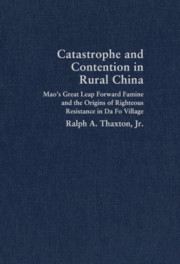 Catastrophe and Contention in Rural China
Catastrophe and Contention in Rural China Book contents
- Frontmatter
- Contents
- Acknowledgments
- Cast of Characters: Da Fo Village (Great Buddha), 1920–1993
- Chronology of Important Events
- Map 1 Provinces of China, neighboring countries, and area of study
- Map 2 Hebei-Shandong-Henan border area, showing location of Da Fo village
- INTRODUCTION
- 1 THE REPUBLICAN ERA AND THE EMERGENCE OF COMMUNIST LEADERSHIP DURING THE ANTI-JAPANESE WAR OF RESISTANCE
- 2 THE ASCENT OF THE VIGILANTE MILITIA: THE VIOLENT ANTECEDENTS OF MAO'S WAR COMMUNISM
- 3 THE ONSET OF COLLECTIVIZATION AND POPULAR DISSATISFACTION WITH MAO'S “YELLOW BOMB” ROAD
- 4 THE MANDATE ABANDONED: THE DISASTER OF THE GREAT LEAP FORWARD
- 5 STRATEGIES OF SURVIVAL AND THEIR ELIMINATION IN THE GREAT LEAP FORWARD
- 6 THE ESCAPE FROM FAMINE AND DEATH
- 7 INDIGNATION AND FRUSTRATED RETALIATION: THE POLITICS OF DISENGAGEMENT
- 8 THE MARKET COMES FIRST: THE ECONOMICS OF DISENGAGEMENT AND THE ORIGINS OF REFORM
- 9 PERSISTENT MEMORIES AND LONG-DELAYED RETALIATION IN THE REFORM ERA
- CONCLUSION
- Bibliography
- Index
- Plate section
5 - STRATEGIES OF SURVIVAL AND THEIR ELIMINATION IN THE GREAT LEAP FORWARD
Published online by Cambridge University Press: 14 May 2010
- Frontmatter
- Contents
- Acknowledgments
- Cast of Characters: Da Fo Village (Great Buddha), 1920–1993
- Chronology of Important Events
- Map 1 Provinces of China, neighboring countries, and area of study
- Map 2 Hebei-Shandong-Henan border area, showing location of Da Fo village
- INTRODUCTION
- 1 THE REPUBLICAN ERA AND THE EMERGENCE OF COMMUNIST LEADERSHIP DURING THE ANTI-JAPANESE WAR OF RESISTANCE
- 2 THE ASCENT OF THE VIGILANTE MILITIA: THE VIOLENT ANTECEDENTS OF MAO'S WAR COMMUNISM
- 3 THE ONSET OF COLLECTIVIZATION AND POPULAR DISSATISFACTION WITH MAO'S “YELLOW BOMB” ROAD
- 4 THE MANDATE ABANDONED: THE DISASTER OF THE GREAT LEAP FORWARD
- 5 STRATEGIES OF SURVIVAL AND THEIR ELIMINATION IN THE GREAT LEAP FORWARD
- 6 THE ESCAPE FROM FAMINE AND DEATH
- 7 INDIGNATION AND FRUSTRATED RETALIATION: THE POLITICS OF DISENGAGEMENT
- 8 THE MARKET COMES FIRST: THE ECONOMICS OF DISENGAGEMENT AND THE ORIGINS OF REFORM
- 9 PERSISTENT MEMORIES AND LONG-DELAYED RETALIATION IN THE REFORM ERA
- CONCLUSION
- Bibliography
- Index
- Plate section
Summary
Written accounts of the Great Leap Forward often have a ring of fatalism. Here was a Maoist state policy failure, followed by debilitating famine and unprecedented social devastation reflected in massive peasant death rates, which reached appallingly high levels in rural communities under the thumb of radical Maoist provincial governors. Da Fo's history supplements, refines, and enriches this representation of the Great Leap, reminding us that the body count of the impending famine was not solely determined either by Maoist conceived policy or by the efforts of local Communist Party leaders to implement commune regulations. Whether villagers succumbed to food shortages and whether mortality rates differed from one village to the next was also conditioned by local popular strategies of survival.
In Da Fo, villagers pursued a number of survival strategies outside the formal institutions of the party-state and occasionally even found succor with the aid of government-run machinery. To be sure, the Great Leap quickly evolved into a devastating social catastrophe, but the people of this village initially were able to stave off its worst consequences. The survival strategies of most Da Fo farmers initially were aimed at preventing zealous Maoist cadres from enforcing the state monopoly of grain ever more tightly and from mobilizing the village labor force for rural industrial projects associated with party-state goals. Few such strategies are recorded in the standard Western scholarship on the famine, and of course most are missing from the annals of official Communist Party history.
- Type
- Chapter
- Information
- Catastrophe and Contention in Rural ChinaMao's Great Leap Forward Famine and the Origins of Righteous Resistance in Da Fo Village, pp. 157 - 198Publisher: Cambridge University PressPrint publication year: 2008


